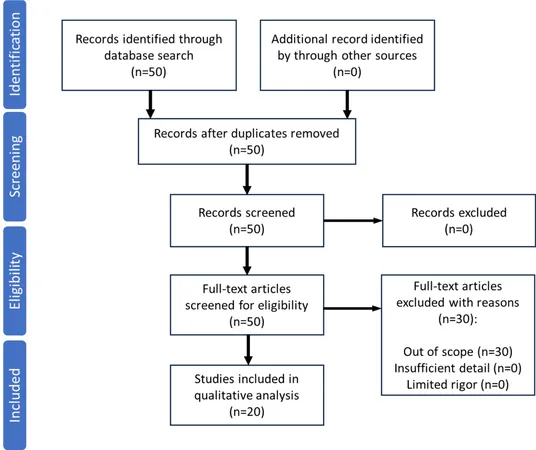
Transforming Healthcare: How Student-Run Free Clinics Are Revolutionizing Preventive Medicine
2024-11-21
Author: Ming
Transforming Healthcare: How Student-Run Free Clinics Are Revolutionizing Preventive Medicine
Student-run clinics are emerging as critical players in providing preventative care, especially in the wake of rising health disparities. A recent narrative review featuring findings from 20 studies has showcased the feasibility, ethical implications, and actionable recommendations for these student-led initiatives.
Boosting Vaccination: The Secret to Success
Six out of the 20 studies examined vaccination efforts, revealing that integrating vaccine education into medical school curricula significantly bolsters not just medical students’ knowledge but also their confidence in discussing immunizations with patients. One notable success story comes from the University of Nevada, Reno School of Medicine. Following a hands-on HPV workshop, vaccination rates soared as students grew more adept at educating patients.
A glaring trend emerged during the COVID-19 pandemic. Student-run clinics across the nation took proactive steps to enhance vaccination rates by addressing barriers such as transportation troubles, language issues, misinformation, and scheduling constraints. For instance, Vanderbilt University's Shade Tree Clinic initiated Sunday vaccination events that included bilingual support, resulting in vaccination rates that paralleled county averages.
The Medical University of South Carolina exemplified this engagement by offering school-mandated vaccines for uninsured children during mass vaccination events, preventing school suspensions and saving families thousands in potential fines. These clinics are not just filling gaps — they’re redefining healthcare accessibility.
Cancer Screening: A Cultural and Community-Centric Approach
While vaccine initiatives dominated, five studies focused on cancer screening, highlighting that cultural competency significantly improves screening rates. The Building Relationships and Initiatives Dedicated to Gaining Equality in Healthcare (BRIDGE) Clinic at the University of South Florida reported a staggering 89.2% cervical cancer screening rate among Hispanic patients, outpacing the national average. This success can be attributed to robust language support and volunteer community health workers who educate patients effectively.
Furthermore, other initiatives showcased how marketing tactics, such as offering free vision exams alongside cancer screenings, compelled underserved populations to utilize preventive services. This multifaceted approach towards addressing cultural needs not only promotes awareness but actively engages communities in prioritizing their health.
Empowering the Next Generation of Physicians
The benefits of preventative medicine extend beyond patient care; they significantly enrich medical students' educational experiences. By engaging in hands-on screenings and patient education, students cultivate essential skills that traditional curricula may overlook. One study emphasized that students involved in HPV awareness campaigns improved their long-term retention of key medical information. Moreover, the diversity of real-world challenges faced in these clinics equips students for the multifaceted nature of modern healthcare.
Overcoming the Challenges: The Ethical Conundrum
Despite numerous successes, student-run clinics grapple with ethical dilemmas. Though they excel at community outreach and preventive services, follow-up care for abnormal findings remains a significant limitation. Without a safety net to provide comprehensive follow-up, patients who test positive for screenings may experience anxiety without appropriate care pathways.
In navigating these ethical waters, student-run clinics must foster partnerships with local hospitals to ensure continuity of care for patients requiring further intervention. This includes establishing clear communication channels that emphasize patient autonomy and informed consent.
Educating the Uninsured: A Necessity for Future Care
As the need for affordable healthcare becomes increasingly pressing, organizations are stepping up to meet community needs. In Rochester, Minnesota, collaborative efforts among student-run clinics and community organizations are essential in providing chronic disease awareness, preventive screenings, and vaccinations to the underserved population.
Recommendations for the Future
To further enhance the impact of student-run clinics, the review posits that incorporating vaccination initiatives into medical training is vital. Interactive workshops and community tailored health events should be standard practice, maximizing student engagement while targeting the needs of vulnerable populations.
The Road Ahead: Challenges and Opportunities
Nevertheless, challenges are omnipresent. The variability in resources and patient demographics means that replicating single-clinic success across different environments requires careful strategic planning. The review also hinted at the risk of publication bias in existing studies, showing the necessity for broader, controlled research to validate the findings.
In conclusion, student-run clinics stand at the forefront of revolutionizing healthcare access, especially as they adeptly address preventive medicine. As they navigate these challenges, their evolution will undeniably shape the future of community health initiatives across the nation. Stay tuned for how these young healthcare leaders will change the landscape of preventive care as we know it!




 Brasil (PT)
Brasil (PT)
 Canada (EN)
Canada (EN)
 Chile (ES)
Chile (ES)
 España (ES)
España (ES)
 France (FR)
France (FR)
 Hong Kong (EN)
Hong Kong (EN)
 Italia (IT)
Italia (IT)
 日本 (JA)
日本 (JA)
 Magyarország (HU)
Magyarország (HU)
 Norge (NO)
Norge (NO)
 Polska (PL)
Polska (PL)
 Schweiz (DE)
Schweiz (DE)
 Singapore (EN)
Singapore (EN)
 Sverige (SV)
Sverige (SV)
 Suomi (FI)
Suomi (FI)
 Türkiye (TR)
Türkiye (TR)